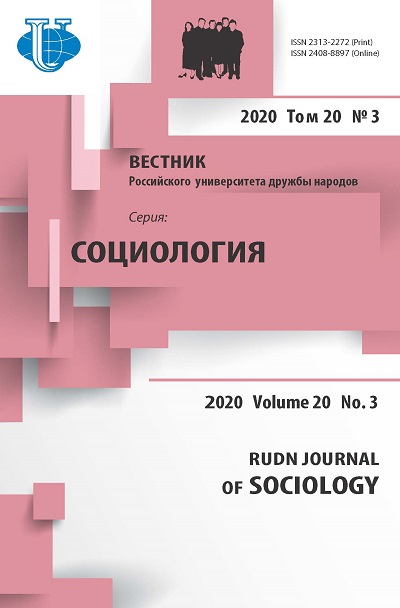Forced shift to distance learning as an impetus to technological changes in the Russian higher education
- Authors: Narbut N.P1,2, Aleshkovski I.A3, Gasparishvili A.T1,3,2, Krukhmaleva O.V1,3
-
Affiliations:
- RUDN University
- Institute of Sociology of the FCTAS RAS
- Lomonosov Moscow State University
- Issue: Vol 20, No 3 (2020)
- Pages: 611-621
- Section: Sociology of Education
- URL: https://journals.rudn.ru/sociology/article/view/24540
- DOI: https://doi.org/10.22363/2313-2272-2020-20-3-611-621
Cite item
Full Text
Abstract
The objective request for the compliance of all spheres of life with the requirements of the information society has accelerated processes determined by the restrictive measures of the covid-19 pandemic. Almost all sectors of the economy were forced to switch to remote working; however, the education system was the most affected. The mass transition to distance learning revealed a number of challenges and contradictions in distant forms of the higher education programs and made the Russian education system respond to the challenges of the digital society. This required a deep analysis of various aspects of distance learning, readiness of all education actors to work remotely, availability of material-technical facilities, methodological support and software, and also an assessment of prospects and scenarios for the development of the Russian education system after the pandemic. In May 2020, the Center for Education Development Strategy at Lomonosov Moscow State University and the RUDN Department of Sociology, with the support of the Russian Professors Assembly, conducted a survey of the academic personnel to study universities’ transition to distance learning. The survey data reveled the real situation in the education system, features of the forced transition to remote working and challenges of such an educational format, and allowed to reconstruct a ‘portrait’ of the teacher most skeptical to distance learning. The study helped to make a number of recommendations on improving forms and methods of learning and on developing education technologies in universities; to identify the main risks of distance education and to suggest possible forms of mixed learning in Russian universities.
About the authors
N. P Narbut
RUDN University; Institute of Sociology of the FCTAS RAS
Author for correspondence.
Email: narbut-np@rudn.ru
доктор социологических наук, заведующий кафедрой социологии Российского университета дружбы народов; главный научный сотрудник Федерального научно-исследовательского социологического центра Российской академии наук
Miklukho-Maklaya St., 6, Moscow, 117198, Russia; Krzhizhanovskogo St., 24/35-5, Moscow, 117218, RussiaI. A Aleshkovski
Lomonosov Moscow State University
Email: aleshkovski@yandex.ru
кандидат экономических наук, директор Центра стратегии образования факультета глобальных процессов
Leninskie Gory, 1, Moscow, 119991, RussiaA. T Gasparishvili
RUDN University; Lomonosov Moscow State University; Institute of Sociology of the FCTAS RAS
Email: gasparishvili@yandex.ru
кандидат философских наук, заместитель директора Центра стратегии образования факультета глобальных проблем
Miklukho-Maklaya St., 6, Moscow, 117198, Russia; Leninskie Gory, 1, Moscow, 119991, Russia; Krzhizhanovskogo St., 24/35-5, Moscow, 117218, RussiaO. V Krukhmaleva
RUDN University; Lomonosov Moscow State University
Email: kruhoks@yandex.ru
кандидат социологических наук, доцент кафедры социологии Российского университета дружбы народов; заведующая отделом центра стратегии развития образования Московского государственного университета им. М.В. Ломоносова
Miklukho-Maklaya St., 6, Moscow, 117198, Russia; Leninskie Gory, 1, Moscow, 119991, RussiaReferences
- Castells M. Informatsionnaya epokha: ekonomika, obshchestvo i kultura [The Information Age: Economy, Society and Culture]. Moscow; 2000 (In Russ.).
- Narbut N.P., Trotsuk I.V. Tsennostnye orientatsii i sotsialnoe samochuvstvie studenchestva (rezultaty issledovatelskogo proekta) [Student Value Orientations and Social Well-Being (Results of the Research Project)]. Moscow; 2017 (In Russ.).
- Otchet o massovom oprose professorsko-prepodavatelskogo sostava vuzov o razvitii onlayn-sredy v usloviyakh koronavirusnoy infektsii [Report on the mass survey of the university teaching staff on the development of the online environment under the covid-19]. URL: https://minobrnauki.gov.ru/ru/press-center/card/?id_4=2603 (In Russ.).
- Smeshannoe obuchenie: traditsii i budushcheye [Mixed learning: Traditions and the future]. URL: https://misis.ru/university/events/conference/2016-09/123 (In Russ.).
- Toffler E. Shok budushchego [Future Shock]. Moscow; 2008 (In Russ.).
- Trotsuk I.V., Sukhoverova D.V. Korporativnaya kultura kak instrument povysheniya konkurentosposobnosti vuza [Corporate culture as a tool for improving university’s competitiveness]. Vysshee Obrazovanie v Rossii = Higher Education in Russia. 2018; 27 (11) (In Russ.).
Supplementary files
There are no supplementary files to display.














